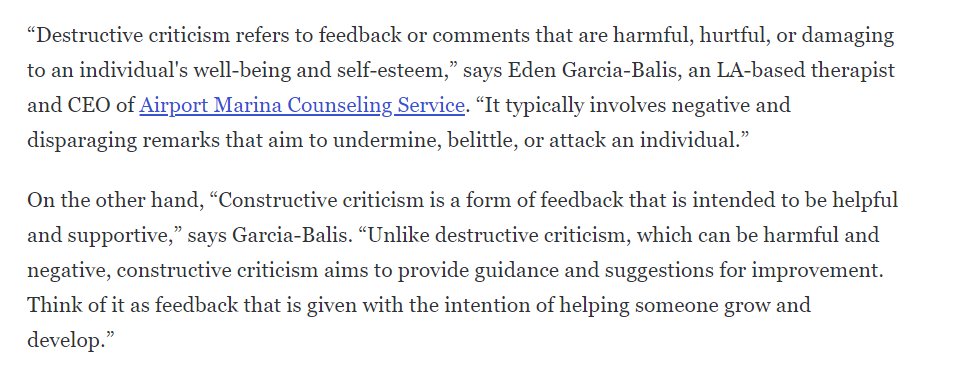August 10th, 2024 – The Necessity of Feedback

As the title implies, feedback is a necessary part of growing and learning in this industry. Let’s face it, we’re not all good at everything. Equally as important, sometimes professional relationships just don’t work out. Don’t you want to know why?
It’s a troublesome topic. Feedback tends to cause people a lot of distress, as most people don’t like to hear when they’ve done things that are less than ideal. It is equally as distressing from the opposite side because people don’t like to be the one who has to break the news that things didn’t go according to plan and they have some difficult subject matter to discuss.
I think feedback needs to be de-stigmatized in this way. When given and received correctly, feedback is incredibly beneficial for both sides. It offers a lot of benefits and should be seen as such. For this reason, I’d like to discuss today why feedback is so important and how we can go about making it a less difficult topic to discuss and engage in.

Role
The role of feedback is simple: showing someone an area within which they can improve.
There is a lot of ego in our society, unfortunately. It seems to have slipped the minds of many that, “To err is human.” Humans make mistakes, we don’t do things perfectly or correctly every time. And with the nature of relationships, even getting something right in one instance with one specific person doesn’t mean doing that a second time is going to also be correct.
Receiving feedback doesn’t need to mean you’re bad, or you’re not good at your job, or that you’re not going to be better moving forward. Feedback is meant to show you an overview of how the situation was perceived by the other person, and where they feel their needs could have been met more effectively. Having this information is valuable, because as unique as your situation was, parts of it can easily be replicated in other working relationships.
Feedback should show you the road map to how you can improve your skills, be more effective in your work, and be a more positive contribution to your working relationships.

Recognizing Constructive vs Destructive Feedback
This is relevant information both if you are giving or receiving feedback. Knowing how to form your feedback in a way that focuses on improvement rather than degradation and abuse will go a long way in how people receive it. As well, when receiving feedback, being able to tell a person’s intentions is critical. People who cannot express feedback in a constructive manner should not be heeded.
To quote The Muse:

Constructive feedback will focus on how this person can improve and ensure issues do not arise in the future. It’s actionable and focused on making that person better. Destructive focuses only on the problem while offering no encouragement or support. It degrades a person for choices made and actions taken.

How To Give Feedback Effectively
When forming feedback, keep it succinct, and focused on the action taken. Express what you expected, what you received, and the consequences of those actions. Offer suggestions that are actionable in how you would have preferred this situation to be handled. Note where your recipient can find the information responsible for outlining the action you expected or agreed upon.
Under no circumstances is it acceptable to degrade a person’s character, talent, or abilities. Isolated actions are not indicators of a person’s overall abilities. Actions taken in a specific situation with you do not indicate a person’s ability to be effective in other situations.
If you want more information on how to tell the difference between destructive and constructive criticism or feedback, read this article.

How To Respond
When receiving feedback, remember to remove your ego. Focus on the information provided. What was expected of your performance? What were your actions lacking in this situation? How can you improve to ensure you don’t have this happen again? How can you engage forethought to better fit the needs of your client before problems like this arise in the future?
Make sure to think logically, not emotionally, about the information you’re receiving. Take accountability for your actions and choices. It’s possible you didn’t meet the expectations of your clients, or you had a different understanding of those expectations at the time. This is not an attack on your character. If you’re unclear, ask how you can better understand these expectations, where you can find the information that outlines the expectations, etc.
Implement the actionable solutions provided in the feedback, and take note of how to avoid these problems in the future.

In Conclusion
Feedback needs to be handled properly in our professional environments so it can be viewed as it is intended. Feedback has been abused in the past as a way to degrade or berate people, and on the other side, it has been used as an excuse for recipients to make problems. That is not the intended goal of feedback. It should be used to improve the skills of the recipient to ensure a positive outcome moving forward. It should be seen as a way to build more effective skills and improve working relationships.
A couple of things to remember: feedback and confrontation are not synonyms, and being kind is free.
I hope this information was valuable to you! If you liked this post or want to share your own experiences and tips, make sure to leave a comment down below. If you want to see more, check out the last post below or the previous posts on the blog. And if you’re interested in learning more scopist, proofreading, or transcription information, make sure to check back every Saturday for a new post on the Next Step Scopist blog!
Sources
https://www.themuse.com/advice/destructive-vs-constructive-criticism-at-work-examples
Home | Blog Home
Last Post: What Is A Scoofer?
Next Post: Funniest AI Mistakes in Transcripts

Leave a Reply